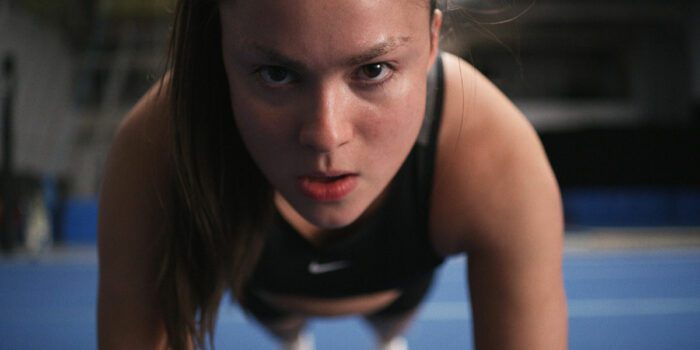For the generation of LGBTQ+ people who grew up in the late ’90s and early-aughts, Bring It On was the gay cheerleading movie. The humor is that the two characters people were convinced were gay, Torrance (Kirsten Dunst) and Missy (Eliza Dushku), weren’t actually queer at all. Even so, it’s remained a cult classic for LGBTQ+ people, but now, in 2023, a new gay cheerleading movie has entered the conversation at the 2023 Toronto International Film Festival: Backspot.
Riley (Devery Jacobs) is a cheerleader on a recreational squad with her girlfriend Amanda (Kudakwashe Rutendo). Their team of cheerleaders is semi-serious, with Riley, Amanda, and Rachel (Noa DiBerto) being the top athletes on the squad. As much fun as they have in their low-stakes practices, they, Riley especially, dream of being called up to the Thunderhawks, an elite cheerleading squad that practices in the gym next door. The Thunderhawks squad is led by Eileen (Evan Rachel Wood) and her assistant (Thomas Antony Olajide). They demand perfection and, due to some injuries, are in need of three cheerleaders before a large competition. This audition is the opportunity Riley has been looking for, but it will come at quite a cost.
Backspot is billed as the cheerleading equivalent of Damien Chazelle’s Whiplash. An overbearing, intense, abusive coach/conductor takes advantage of a young person’s dreams and desire for greatness. There’s also the lesser-known queer movie, The Novice, which is the rowing version of Whiplash. The problem with Backspot comparing itself to Whiplash is that when audiences hear that reference, they’re expecting a certain intensity and darkness from the character in a position of power and an end-all-be-all obsession from the young person. The scene of Miles Teller’s Whiplash character getting into a car accident on his way to a performance and still trying to drum while bleeding from a head wound sums up the intensity perfectly.

In Backspot, there are glimpses of that level of intensity. Riley has a few panic attacks and deals with her anxiety by picking at her eyebrows so much that she only has half the hair left. Those who are easily grossed out by bloody blisters should consider viewing with caution. The feet of elite cheerleaders (and athletes in general) are bruised, peeling, and battered, and Backspot doesn’t shy away from showing that to the audience. It’s one of the ways the film demonstrates the toll the sport is taking on Riley, but she never reaches the obsession to the point of self-destruction that the story begs of her. Maybe if we hadn’t all gotten invested in the cheerleading in the Netflix offerings Cheer and Bring It On, it would be easier to believe that Riley doesn’t need to be that intense.
Speaking of intensity, there is so much potential that could have been mined from the relationship between Riley and Coach Eileen. Riley is in awe of Eileen because she’s a successful coach, but her admiration takes a turn when Eileen mentions an ex-wife. Riley becomes even more in awe of this woman because of her queerness. Eileen is almost like a blueprint of the type of future Riley could obtain. More than that, Riley seeks Eileen’s approval as a stand-in mother figure because Riley doesn’t get along well with her own mom. Then there’s the feeling that RIley may have a little crush on Eileen. All of these swirling dynamics demonstrate the potential of Backspot. They show the strong foundation the film was built on, but when none of these paths are fully examined, the film feels underrealized.
Even if Backspot doesn’t fully live up to Whiplash or take the gay cheerleading spirit stick away from Bring It On, there’s still a lingering feeling of thankfulness. The drama never comes from the characters’ queerness, the parents are supportive, and, spoiler alert, there’s a happily ever after of sorts. As someone who grew up in a time when queerness in pop culture was always shrouded in tragedy, it felt a bit like a fever dream to watch two happy, queer teens have a date night montage at the movie theater. That’s not the only joyful montage we get of Riley and Amanda’s relationship, and that alone adds purpose to the film’s themes. It’s the sort of movie that makes you wish you could’ve experienced it as a teenager, when you needed it most.




